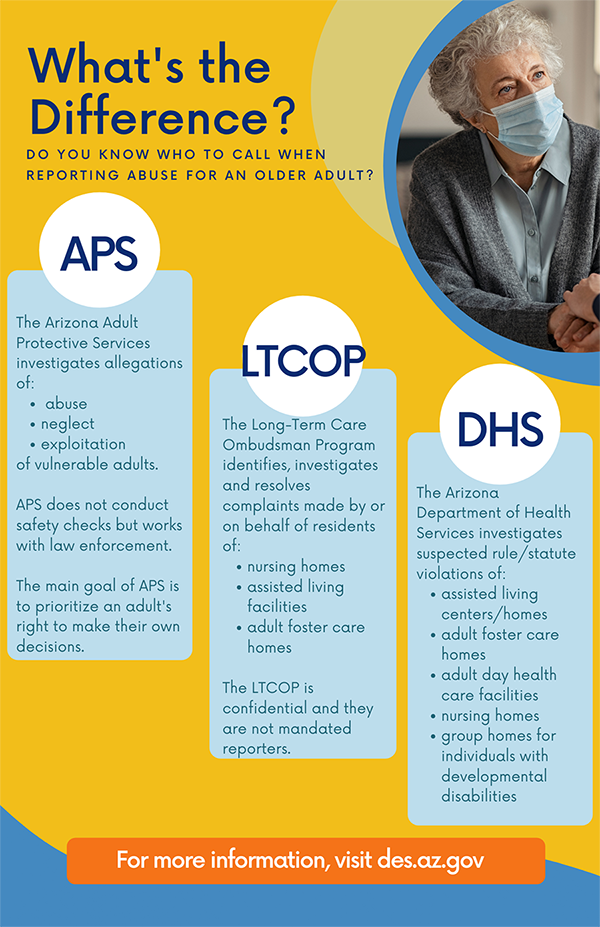Helping Older Adults

This past year, many older adults and individuals with disabilities were without connection and interaction with people outside of their immediate family and/or residential setting. For many older adults and others in living facilities, this lack of interaction can have a huge impact on their ability to receive the best care possible and report any abuse or maltreatment threatening their safety and general wellbeing.
However, a myriad of services, supports and ways to report abuse or maltreatment are available to older adults and individuals with disabilities, their caretakers and relatives, through Arizona Department of Economic Security’s (DES) Adult Protective Services (APS), as well as through Long-Term Care Ombudsmen and the Arizona Department of Health Services (ADHS). All of these entities are dedicated to ensuring the highest quality of life for vulnerable adults, but what exactly is the difference between them?
Adult Protective Services
Adult Protective Services investigates reports of abuse, neglect and exploitation of vulnerable adults. APS may also become involved when there is a claim of self-neglect when an adult with physical or mental impairments is not able to meet their basic needs (such as food, shelter, health care, managing money, etc.) which then impacts the adult’s physical health, mental health or general safety. The goal of APS is to prioritize an adult’s right to make their own decisions while keeping them safe.
When visiting a loved one, whether that’s in their own home or a facility, it’s important to recognize the signs of abuse, neglect and exploitation. Physical indicators can include suspicious bruises, burns, bite marks or binding marks. Behavioral indicators can include suicidal thoughts, use/abuse of alcohol or other drugs, and fear of a particular place or being with a specific person. Living and environmental indicators can include infestations, safety concerns, hoarding situations and lack of working utilities.
APS does not conduct safety checks, but local law enforcement does. Law enforcement and APS work together and if law enforcement believes an individual is a vulnerable adult, they will contact APS.
You can report online or by phone Monday - Friday 7:00 a.m. to 7:00 p.m. and Saturdays, Sundays and state holidays 10:00 a.m. to 6:00 p.m. The APS online reporting form is available 24-hours a day, seven days a week.
For more information on APS, visit the APS website.
Long Term Care Ombudsman Program
The Long-Term Care Ombudsman Program (LTCOP) identifies, investigates, and resolves complaints made by or on behalf of residents of nursing homes, assisted living facilities, and adult foster care homes.
The LTCOP grew out of efforts by both federal and state governments to respond to widely reported concerns that our most frail and vulnerable citizens (those living in long-term care facilities) were subject to abuse, neglect and substandard care. These residents also lacked the ability to exercise their rights or voice complaints about their circumstances.
The ombudsman will make every reasonable effort to assist, advocate, and intervene on behalf of the resident. When investigating complaints, the program will respect the resident, maintain their confidentiality, and focus their resolution of a complaint according to the resident’s wishes.
Please note that LTCO are not mandated reporters, meaning they are not obligated to report abuse if the resident does not want them to do so.
The LTCOP contracts with the Area Agencies on Aging where there are Ombudsmen throughout the state that cover specific regions and their facilities. Some of the Ombudsmen cover over 200 facilities.
For more information on the LTCOP, visit the LTCOP website.
Department of Health Services Licensing
The Arizona Department of Health Services (DHS) licenses several types of long-term care facilities, regulating their operations and investigating suspected rule/statute violations. The facilities they oversee include:
- Assisted Living Centers/Homes
- Adult Foster Care Homes
- Adult Day Health Care Facilities
- Nursing Homes
- Group Homes for Individuals with Developmental Disabilities
Examples of complaints that should be reported to DHS are:
- Staff is not following protocol when transferring a resident.
- Staff is not following protocol for safely storing medications.
- Medication is not administered in compliance with medication orders for residents.
To file a licensing complaint, visit the DHS website.


